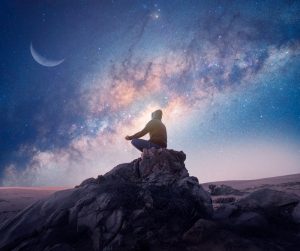The topic of meditation is particularly close to my heart. I have been practicing this form of cognition for about six years, which has not only allowed me to embark on the greatest adventure of my life, but has also led me to completely reevaluate my experiences and myself.
Not surprisingly, when I first encountered the subject of psilocybin – the active compound of Magic Truffles and Mushrooms – it was the aspect of its effect on consciousness that I was most curious about.
It is with great joy that I invite you to join me on my next journey, in which we will try to explore the effects of psilocybin on meditative states and answer the question: can psilocybin be a powerful ally on the path to deeper self-knowledge?
A few words about meditation
Meditation has been practiced by almost all cultures of the world and has shaped people’s perceptions of themselves and reality for centuries. Once widely cultivated, today it is almost forgotten, often replaced by affirmations and mind work.
 Modern meditation is seen as a way to combat stress, calming thoughts and regulating emotions, and quieting the mind. Yes, the practice, almost in passing, improves mental health and cognitive function, but true meditation is something much deeper. It is an active form of contact with a part of ourselves that we don’t experience on a daily basis.
Modern meditation is seen as a way to combat stress, calming thoughts and regulating emotions, and quieting the mind. Yes, the practice, almost in passing, improves mental health and cognitive function, but true meditation is something much deeper. It is an active form of contact with a part of ourselves that we don’t experience on a daily basis.
The modern perception of meditation is very superficial, making it almost impossible to get to its true core. Why is this the case? Certainly one reason is the inability to “break through” on our own, to enter higher states of consciousness through the mere desire to calm the mind and quiet the emotions.
Since the dawn of time, mankind has tried to find a way to enter higher states of consciousness more easily, using various substances to facilitate entry into a state of joy, peace and well-being. For only in such a state is active communication with the higher part of oneself possible.
What do meditation and psilocybin have in common?
From an empirical point of view, meditation and psilocybin appear to have a similar field of action, suggesting that they may be two different ways of achieving a single goal. However, the two techniques can simultaneously complement and support each other.
Psilocybin’s potential to induce mystical experiences has long been known, but recent scientific studies have shed light on the potential synergistic effects of meditation and psilocybin.
In 2008, an article appeared in the Journal of Psychopharmacology describing a study that found that nearly 60% of participants who were given a large dose of psilocybin had a “total mystical experience.”
The study was very precisely designed and conducted in a clinical setting with the help of a trained psychotherapist. The experiences reported by the participants were the same as those reported by mystics in the past and present.
The philosophical authority, W. T. Stace, describes the experience induced by psychedelics unequivocally: “It is not that it is similar to a mystical experience; it is a mystical experience.”
Achieving deeper states of consciousness after taking psilocybin seems to be easier for those familiar with the practice of meditation. The mental training and discipline involved in entering deeper registers of consciousness and maintaining higher levels of awareness can clearly make it easier to navigate the experiences induced by psilocybin use.
So if meditation can facilitate the psychedelic journey, it makes sense that it works the other way as well.
Many people begin to seek a better understanding of their own spirituality after taking magic truffles or mushrooms. There is often a growing interest in religions, deep psychology and mysticism in the broadest sense.
Synergistic effects of psilocybin and meditation
At the end of March 2024, a study on the interaction of psilocybin and meditation was published in the journal Scientific Reports. For the first time, magnetic resonance images collected during meditation before and after a five-day psilocybin-assisted meditation retreat were examined. The study was conducted on a group of thirty-six experienced meditators using a double-blind, placebo-controlled methodology.
In the study, participants were randomly assigned to a group receiving psilocybin or placebo. The substance was administered in a controlled environment, and participants’ brain activity was then monitored using functional magnetic resonance imaging (fMRI). The fMRI technology made it possible to track in detail changes in blood flow in various areas of the brain, an indicator of neuronal activity.
The study used a precisely defined dose of psilocybin, allowing the induction of deep states of consciousness without risking adverse psychological effects.
Study results
Analyses using functional magnetic resonance imaging (fMRI) revealed significant changes in brain activity and connectivity. One of the most interesting findings was a reduction in activity in the brain’s default mode network (DMN).
The DMN is associated with processes of thinking about the self, reflecting on the past and planning for the future, and its reduced activity often correlates with a reduction in egocentric thinking, which can lead to deeper insight and an increased sense of unity. Participants also reported an increased sense of clarity and objectivity in evaluating their own experiences, which may have long-term therapeutic benefits, especially for those suffering from chronic mood disorders such as depression.
The study in question suggests that combining psilocybin with meditation may lead to synergistic effects, increasing the effectiveness of each practice.
Further research is needed to better understand these interactions and develop methods that could be used in therapies aimed at personal development and the treatment of mental disorders. The results of this study open new doors for psilocybin applications in therapeutic contexts, especially in combination with meditation techniques.
The future of extraordinary connection
Both meditation and psilocybin show broad potential for enhancing the ability to reach deeper states of consciousness. Combining the two methods may open up new possibilities for deeper human understanding and may enable a deeper and broader view of reality. This makes them interesting candidates for further research and therapeutic applications.
Discoveries about psilocybin’s positive effects on meditation practice could significantly change approaches to psychedelic therapy. Psilocybin can help achieve states of deep relaxation more quickly and induce mystical experiences that usually require lengthy practice. Psilocybin therapy may be effective in helping people with concentration problems and overcoming emotional barriers that prevent effective meditation.
Further research on the combination of psilocybin and meditation is crucial to better understand the mechanisms responsible for their synergistic effects.
Longer-term studies are needed to assess the durability of the therapeutic effects and the potential benefits or risks of regular psilocybin use in the context of meditation.
